

Brand Architecture: Eliminating Confusion. Providing Structure. Adrien de Tricornot, Grandes écoles : lieu de formation ou passeport social pour la vie ?
Soft skills 2021. Working remotely: the pros and cons of working from home. FromFrom their ersatz offices in coffee shops, coworking spaces, and living rooms, a growing number of remote workers are quietly remaking the way we work and live.
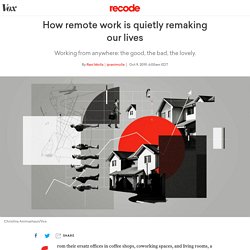
Take Eden Rehmet, who was able to parlay her wages working in trade services at a New York City commodities broker into buying a home and opening a small business upstate. Rob Osoria, a web developer, works remotely from Brooklyn half of the week to skip a commute to his Manhattan office. And interior designer Meg Lavalette gets the best of both worlds by living and doing the majority of her work in rural upstate New York, while traveling to New York City every other week to meet with clients.
All of them told Recode that apart from a few downsides, they have improved the quality of their lives by working remotely and releasing their tether to specific places near their employers. The changes remote work has introduced have happened so gradually you may not have noticed. The ups and downs of remote work. Connecting the curious. Why do students often ask — will this be on the test?
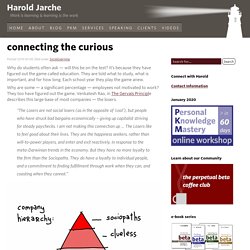
It’s because they have figured out the game called education. They are told what to study, what is important, and for how long. Each school year they play the game anew. Ways of Working: Perspective Shift. A great many Organisations have a focus on future ‘ways of working’: sometimes expressed as a future culture, sometimes as specific digital skills, often as an approach to innovation or change.
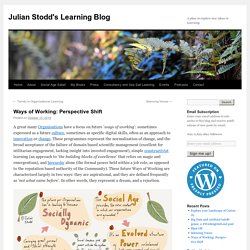
These programmes represent the normalisation of change, and the broad acceptance of the failure of domain based scientific management (excellent for utilitarian engagement, lacking insight into invested engagement), simple constructivist learning (an approach to ‘the building blocks of excellence’ that relies on magic and emergentism), and hierarchy alone (the formal power held within a job role, as opposed to the reputation based authority of the Community). These future Ways of Working are characterised largely in two ways: they are aspirational, and they are defined frequently as ‘not what came before’. Technology as the Missing Link: The Industry-University Partnership. How to meet students where they are—and to re-skill for today’s workforce.
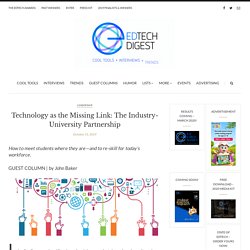
GUEST COLUMN | by John Baker In today’s constantly changing labor market, learning doesn’t end when you get your degree. Today’s workforce is made up of lifelong learners. If employers want to hire and retain the most skilled workers, they have the impetus to provide employees with more opportunities for upskilling and retraining. At the same time, institutions of higher education can’t simply consider their job complete when they confer a degree. The Significance of Upskilling According to data from World Economic Forum, approximately 10% of an employee’s time will need to be devoted to upskilling in the modern workplace to ensure skills are up to date. ‘The number one ask of more than half of job-seeking millennial workers is learning and growth…’ For corporations, we’ve seen that simply launching a tuition rebate program to assist upskilling isn’t the solution. Enter the corporate-education partnership.
Related. Maine Voices: Education key to meeting workforce needs. I am a proud, lifelong Mainer.
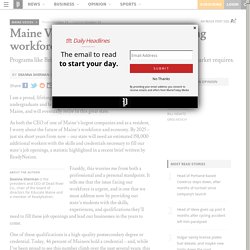
I was born in Maine, attended undergraduate and business school in Maine, have built a career in Maine, and will eventually retire in this great state. As both the CEO of one of Maine’s largest companies and as a resident, I worry about the future of Maine’s workforce and economy. By 2025 – just six short years from now – our state will need an estimated 158,000 additional workers with the skills and credentials necessary to fill our state’s job openings, a statistic highlighted in a recent brief written by ReadyNation. Fowwhitepaper. The Fourth Industrial Revolution could spell more jobs – not fewer. Ever since Homo erectus carved a piece of stone into a tool, the welfare of humanity has been on the increase.
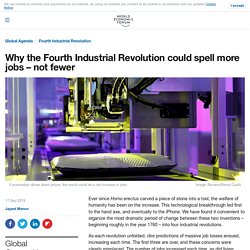
This technological breakthrough led first to the hand axe, and eventually to the iPhone. We have found it convenient to organize the most dramatic period of change between these two inventions – beginning roughly in the year 1760 – into four industrial revolutions. As each revolution unfolded, dire predictions of massive job losses ensued, increasing each time. The first three are over, and these concerns were clearly misplaced. The number of jobs increased each time, as did living standards and every other social indicator. McKinsey predicts that 800 million workers could be displaced in 42 countries, or a third of the workforce, because of the Fourth Industrial Revolution (4IR).
Trending Soon 2020: Workforce Trends Shaping Our World. « Les grandes écoles doivent former à la “redirection écologique” » Tribune.
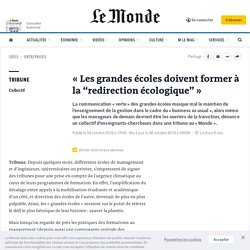
Depuis quelques mois, différentes écoles de management et d’ingénieurs, universitaires ou privées, s’empressent de signer des tribunes pour une prise en compte de l’urgence climatique au cœur de leurs programmes de formation. En effet, l’amplification du décalage entre appels à la mobilisation étudiante et académique d’un côté, et direction des écoles de l’autre, devenait de plus en plus palpable. Ainsi, les « grandes écoles » seraient sur le point de relever le défi le plus héroïque de leur histoire : sauver la planète. Mais lorsqu’on regarde de près les pratiques des formations au management (devenu aussi une composante centrale des formations d’ingénieur, de design, voire de sciences politiques), la réalité est tout autre.
Les problèmes écologiques sont abordés essentiellement sous l’angle de l’économie ou de la gestion. . « Les business schools ont une faculté naturelle à détourner tout ce qui pourrait contraindre le déploiement des affaires économiques » [PDF] The imperative for preparing for the Futu...